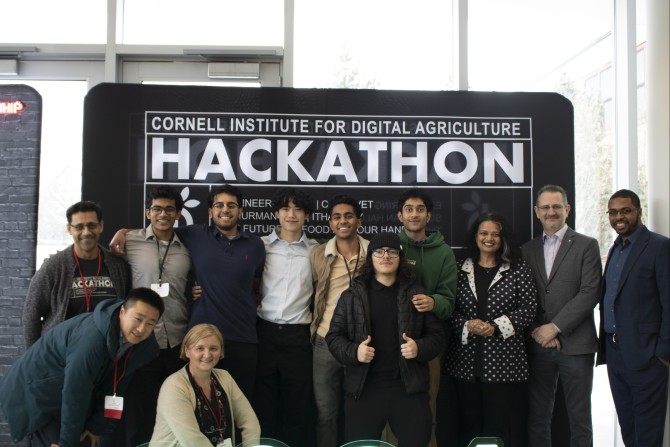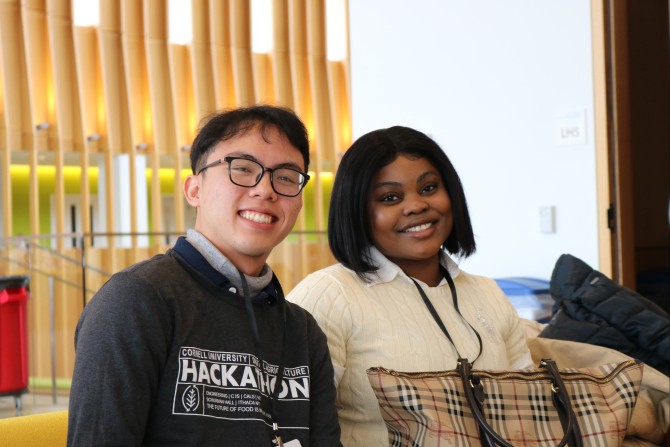News directly from Cornell's colleges and centers
Freshmen win top prize at digital ag hackathon
By Kathy Hovis
Six first-year students from the Colleges of Arts & Sciences and Engineering and the Cornell Ann S. Bowers College of Computing and Information Science came away with top honors for their agricultural innovation idea to address India’s pollution problem during the Digital Agriculture Hackathon Feb. 16-18.
“The Freshmen,” as they cleverly named themselves, entered the hackathon knowing they wanted to find a solution to a real-world problem, but their idea of using rice straw as a substrate for growing mushrooms literally “mushroomed” during the weekend-long event.
“We came to the hackathon not to find a solution, but to find a problem that’s worth finding a solution for,” said Sai Nellutia ’27. “That was our biggest motivation. We wanted to solve a societal issue. Air pollution is causing 16,200 deaths every year, just in the city of New Delhi.”
The hackathon was sponsored by the Cornell Institute for Digital Agriculture (CIDA) and Entrepreneurship at Cornell. More than 120 students took part in the event in Schurman Hall in the Cornell University College of Veterinary Medicine.
“All of these students are part of this movement of the transformation and revolution of digital agriculture,” said Renata Ivanek PhD '08, professor at the College of Veterinary Medicine and co-director of CIDA.
“If anyone watched the presentations today, whether the students were computer scientists, or from agriculture, or veterinary medicine or biology, there was a common goal, an ambitious goal of feeding the planet,” said José F. Martínez, the Lee Teng-hui Professor and senior associate dean for diversity & academic affairs in the
College of Engineering “That’s the kind of thinking that makes institutions like this one different from anywhere else.”
Students formed teams on Monday and Thursday before the hackathon, then began meeting in person Friday night with a kickoff event. Saturday included work sessions and chats with the 40+ mentors, as well as time preparing pitches. Teams gave pitches Sunday morning and winners took part in a final pitch round Sunday afternoon before winners were announced.
Students from Penn State, the University of Connecticut and Vin University in Vietnam also attended the hackathon and many placed in finalist teams.
Nellutia and Rohan Sonakya ’27 of “The Freshmen” led their pitch presentation with a video they took from travels to India, showing the level of air pollution they encountered. A major cause is the burning of rice straw. Team members discovered during their weekend research that after rice grains are harvested from Indian fields, nearly 80 percent of rice straw, 6.5 million tons, is burnt rather than composted because burning is cheaper for farmers.
“We couldn’t even drive, there was too much smoke,” Sonakya said.
Team members — Anthony Paredes-Bautista ‘27, Sai Nellutia ‘27, Vansh Bherwal ’27, Nihaal Konda ‘27, Rohan Sonakya ’27 and Nick Channg ‘27— said they will use the $3,000 prize to continue working on the idea.
When the team of friends entered the hack on Friday night, they weren’t sure of their idea and thought they would build a web application — they’re all computer science (CS) majors.
Their company, Prakriti, would give farmers knowledge, subsidies and mycelium to grow and sell rice-straw mushrooms with crop residue. The team found that the solution has already proven successful in Vietnam, the Philippines and Cambodia.
Although they are CS majors, some members of the team have had some business experience. Bherwal said he and Nutella met before Cornell at a DECA Inc. competition, an organization that sponsors clubs in high schools and colleges to encourage entrepreneurship and business skills.
“Our best strategy was asking for help from the mentors,” Bherwal said. “At first it was intimidating, these people would come into our room and ask us what we were working on, but we realized they were there to help us grow our ideas.”
“We shifted from what we were comfortable with, with our technical experience, into a business model,” Konda said. “And that experience of venturing out of our comfort zone was invaluable.”
Other team winners at the hackathon were:
Most market ready: Fem 5 team of Lauren Meyer DVM ‘26, Danielle Falcon MBA ‘24, Bhavishya Agarwal MENG ‘24, Yaa Acahampong MENG ‘24, Angelique Jan Miane MENG ‘24
Best data-driven solution: Bonsai team of Jonathan Moon MS ‘24, Jhalak Sahay ‘25, Srikanth Karaikal PhD ‘27, Kushal Kumar Digavinti MS ‘24, David Han ‘25, Yirtai Liu
First place, One Health challenge: Tiger Team of Shreyas Sunil MENG ‘24, Ariba Akber MENG ‘24, Aritra Das MENG ‘24, Sai Vishnu Bolisetty MENG ‘24, Aqsa Iqbal MPH ‘25, Kathryn Gaddie MPH ‘25
First place, Circular Agrifood Systems and Economy challenge : Beefy Bugs team of Izzy Giacobe ‘26, Ngoc Nguyen ‘26, Nathan Preuss PhD ‘27, Karim Dergal ’25, Adeniyi Fagbewesa ‘24
This hackathon was one of four hosted this academic year by Entrepreneurship at Cornell. The next one is March 8-10 in New York City and is focused on patient safety in healthcare. Find more hackathon information on the Entrepreneurship at Cornell website.
Media Contact
Get Cornell news delivered right to your inbox.
Subscribe


